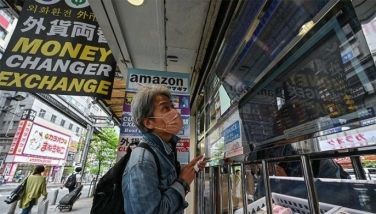BOI to decide on FMC petition vs Ford today
October 20, 2000 | 12:00am
Faced with mounting pressures to take a decisive step, the Board of Investments (BOI) will meet today to decide on the petition filed by Francisco Motor Corp. against Ford Motor Co. Philippines.
Department of Trade and Industry (DTI) officials met with the IMF last week to discuss the country’s trade and investment policies. In that meeting, fund officials expressed apprehension over the government’s plan to use its new safeguard measures laws against imports, particularly chicken.
Officials present during the meeting said the IMF was specifically concerned about foregone revenues resulting from the implementation of the government’s incentives program.
Under the proposed program now pending in Congress, government is offering a 12-year income tax holiday for companies registered under the BOI, as well as the waiver of various other charges and fees. According to the official, however, government assured the IMF that the economic multiplier effect of incoming investments could easily offset the revenues that government would have to give up at the outset.
In 1998, the BOI granted incentives worth P4.543 billion and in 1999, this grew to P5.014 billion. This represented revenues that could have been collected from corporate income taxes.
The IMF is concerned that government will have an even harder time generating enough revenues to cover its budget deficit if it gives any more incentives under the new law being considered by Congress. However, the official said the incentive measures are necessary to attract investments that the entire Asian region is competing for. This leaves the government little choice but to offer incentives that are at par with its closest competitors in the region.
During the meeting, the IMF also inquired about government’s plan to use its new safeguard measures against imports, expressing specific concerns over further moves to block the entry of chicken parts from the US.
According to the official, the government remained non-committal and said only that the provisions of the new law would be applied "if and when the need arises."
Under the new law, the government could implement various measures to protect local industries, specifically in the agriculture sector since most of the sensitive products marked for continued protection are agricultural.
These measures could range from high tariffs to quantitative import restrictions that would limit the volume of imported products entering the country depending on the industry being protected.
The most heavily protected agricultural products at present are rice, corn, sugar and poultry products.
Department of Trade and Industry (DTI) officials met with the IMF last week to discuss the country’s trade and investment policies. In that meeting, fund officials expressed apprehension over the government’s plan to use its new safeguard measures laws against imports, particularly chicken.
Officials present during the meeting said the IMF was specifically concerned about foregone revenues resulting from the implementation of the government’s incentives program.
Under the proposed program now pending in Congress, government is offering a 12-year income tax holiday for companies registered under the BOI, as well as the waiver of various other charges and fees. According to the official, however, government assured the IMF that the economic multiplier effect of incoming investments could easily offset the revenues that government would have to give up at the outset.
In 1998, the BOI granted incentives worth P4.543 billion and in 1999, this grew to P5.014 billion. This represented revenues that could have been collected from corporate income taxes.
The IMF is concerned that government will have an even harder time generating enough revenues to cover its budget deficit if it gives any more incentives under the new law being considered by Congress. However, the official said the incentive measures are necessary to attract investments that the entire Asian region is competing for. This leaves the government little choice but to offer incentives that are at par with its closest competitors in the region.
During the meeting, the IMF also inquired about government’s plan to use its new safeguard measures against imports, expressing specific concerns over further moves to block the entry of chicken parts from the US.
According to the official, the government remained non-committal and said only that the provisions of the new law would be applied "if and when the need arises."
Under the new law, the government could implement various measures to protect local industries, specifically in the agriculture sector since most of the sensitive products marked for continued protection are agricultural.
These measures could range from high tariffs to quantitative import restrictions that would limit the volume of imported products entering the country depending on the industry being protected.
The most heavily protected agricultural products at present are rice, corn, sugar and poultry products.
BrandSpace Articles
<
>
- Latest
- Trending
Trending
Latest
Trending
Latest
Recommended





























